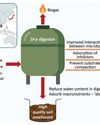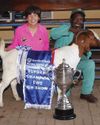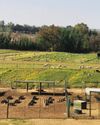Poging GOUD - Vrij
Understanding the difference between inbreeding and linebreeding
Stockfarm
|November 2025
The distinction between inbreeding and linebreeding is often confusing. A common misconception is that successful outcomes are attributed to linebreeding, whereas failures are blamed on inbreeding. Another inaccurate belief is that inbreeding refers to sibling matings (for example brother and sister), whereas linebreeding involves parent-offspring pairings. In reality, both scenarios are incorrect and should never be pursued intentionally due to its potentially serious genetic consequences.
While avoiding inbreeding entirely can be challenging, especially in small populations, it is possible. For example, pedigrees of the South African Friesian horse trace back to the late 1800s, and despite being a relatively small population, breeders have successfully kept average inbreeding levels low through careful planning, selective breeding, and the strategic importation of animals.
Disadvantages of inbreeding
The true definition of inbreeding is the mating of closely related animals, such as brother x sister, parent x child, or nephew x niece. The disadvantages have been well documented and thoroughly researched. Inbreeding reduces variation within the population and can lead to the loss of valuable genes, since fewer unique ancestors are represented in an individual's pedigree.
The most serious drawback is inbreeding depression. This occurs when harmful genes, such as those associated with reduced fertility, poor survival rates or weakened immunity, are widespread in the population. Inbreeding therefore reduces genetic diversity and, in severe cases, contributes to the extinction of a breed or species.
Dit verhaal komt uit de November 2025-editie van Stockfarm.
Abonneer u op Magzter GOLD voor toegang tot duizenden zorgvuldig samengestelde premiumverhalen en meer dan 9000 tijdschriften en kranten.
Bent u al abonnee? Aanmelden
MEER VERHALEN VAN Stockfarm

Stockfarm
Boer goat management: Dosing for success
Boer goats were bred for South African conditions, making them hardy and well-adapted. However, like sheep, they still need to be dosed against parasites.
2 mins
November 2025
Stockfarm
Understanding the difference between inbreeding and linebreeding
The distinction between inbreeding and linebreeding is often confusing. A common misconception is that successful outcomes are attributed to linebreeding, whereas failures are blamed on inbreeding. Another inaccurate belief is that inbreeding refers to sibling matings (for example brother and sister), whereas linebreeding involves parent-offspring pairings. In reality, both scenarios are incorrect and should never be pursued intentionally due to its potentially serious genetic consequences.
2 mins
November 2025

Stockfarm
Dry anaerobic digestion: A sustainable, water-wise, waste-to-energy solution
Imagine an ideal world where cattle manure, crop waste and food scraps do not end up accumulating in landfills but are used to light up homes, cook meals, heat schools, and fertilise gardens.
4 mins
November 2025

Stockfarm
Is the 'second bite' really so bad?
One of the most common misconceptions among grazing managers is that allowing animals to graze grass regrowth is harmful, says Richard Fynn, professor of Rangeland Science at the Okavango Research Institute, University of Botswana.
4 mins
November 2025

Stockfarm
2025 Toyota SA National Young Auctioneer crowned
The winner of Plaas Media's Toyota SA National Young Auctioneer Competition was crowned on 12 September at NAMPO Cape in Bredasdorp. Five top aspiring auctioneers vied for the title, but it was Toog Vermaak who walked away with the honours. This marked the twelfth edition of the competition, with Toyota SA proudly serving as the name sponsor since its inception.
1 mins
November 2025
Stockfarm
Labour dynamics in South Africa's agricultural sector
Statistics South Africa's Labour Force Survey for the second quarter of 2025 released in August, estimates that around 16,8 million people were employed at that time. This represents an increase of approximately 0,9% (around 154 000 people) compared to last year. The unemployment rate is estimated at 33,2%, down 0,3% from a year earlier, but 0,3% higher than in the first quarter of 2025. Including discouraged job seekers, the broad unemployment rate stands at 42,9%.
5 mins
November 2025

Stockfarm
Boer goat management: Dosing for success
Boer goats were bred for South African conditions, making them hardy and well-adapted. However, like sheep, they still need to be dosed against parasites.
2 mins
November 2025
Stockfarm
Installation of electricity to improve farm dwellings
The Supreme Court of Appeal has upheld a Land Court ruling in Sibanyoni family vs Van der Merwe (the Sibanyoni case) namely that farm dwellers' right - as defined in the Extension of Security of Tenure Act, 1997 (Act 62 of 1997) (ESTA) – to improve their dwellings includes the right to have electricity installed.
2 mins
November 2025

Stockfarm
An integrated enterprise on a small piece of land
Hennie and Liza-Mari Jonker manage a highly productive 6,6ha farm outside Kroonstad, where they farm more than 800 sheep, 1 500 laying hens, two dozen Boer goats, and a flock of Damara sheep – all with the goal of living as self-sufficiently as possible.
5 mins
November 2025
Stockfarm
Importance of standardised testing in accurate genetic evaluation
In recent years, the beef breeding industry has witnessed a surge in private performance testing service providers catering to cattle breeders. This makes it more important than ever to emphasise the value of standardised performance testing procedures at testing centres. Such standards ensure that tests are scientifically sound, that the collected data is reliable, and that the results add value to breeders' selection decisions while benefiting the national beef industry.
2 mins
November 2025
Listen
Translate
Change font size

